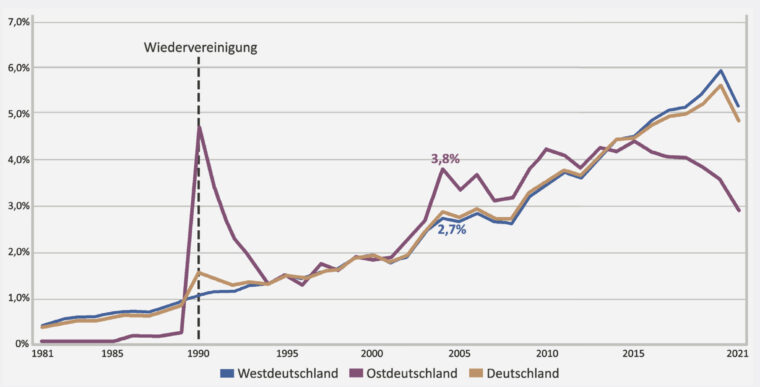Online trade differs in East and West Germany

Most online companies in Germany are located in the Western regions North Rhine Westphalia (22 percent) and Bavaria (17 percent). Only 1.75 percent come from the Eastern regions Thuringia and 1 percent from Mecklenburg-Western Pomerania.
These data come from the first E-Commerce Atlas Germany, a study by Ibi Research, Amazon Germany and the Federal Association of E-Commerce and Mail Order Germany (Bevh). The study maps ecommerce throughout Germany and surveys ecommerce activities, economic structural differences and regional framework conditions of retail companies.
Differences in average annual turnover
According to the study, online sellers in West Germany achieve an average annual turnover of 29.39 million euros. East German online sellers generate just 6.37 million euros. This shows that the economic strength of online companies differs in these regions. West German online sellers also employ more people on average (29 people), than East German ones (13 people).

Overview of distribution online sellers in Germany
“For the first time, the ecommerce atlas provides an overview of the distribution of online retailers in Germany. In doing so, it very clearly analyzes the regional differences and shows which ‘lever’ must be used in order to continue to successfully develop online retail in the future”, said dr. Georg Wittmann, managing director of Ibi Research.
‘Digitization should offer the opportunity to catch up economically. However, success is unevenly distributed.’
“Germany’s regions tap into the potential of digitization in very different ways. This is dramatic because digitization should offer structurally weak areas in particular the opportunity to catch up economically. Although the internet was invented in 1990, the year of the reunification, and companies in both East and West technically started from scratch, today the success seems very unevenly distributed,” explained Martin Groß-Albenhausen, deputy general manager of Bevh.
Marketplaces are important accelerators
Approximately 100,000 online businesses were taken into account in this study. However, it also included over 10,000 companies that sell products on marketplaces like Amazon, eBay, Otto and/or Kaufland. The report shows that marketplaces are important accelerators of digitization in retail.
The median turnover of sellers on marketplaces is €2 million euros.
The median turnover of sellers on marketplaces is two million euros, which is higher than the median turnover of all Germane online sellers (a little more than 1 million euros). Additionally, the average amount of employees of sellers on marketplaces is 31.1, while the average in all ecommerce companies is 27.1. Only 17.8 percent of sellers on marketplaces have a negative equity ratio, compared with 19.8 percent for all ecommerce companies in Germany.
Strengthening ecommerce framework
Markus Schöberl, director Seller Services Amazon Germany, said: “I consider the findings of this study to be very important, because I believe they show that there is a backlog in the promotion of small and medium-sized online retailers in eastern Germany. Only if at least similar framework conditions for start-ups and growth are guaranteed throughout the country can all entrepreneurs and customers benefit from the advantages of e-commerce.”
The research wants to promote digitization to strengthen the ecommerce trade in the country. Their ideas of doing that include, among others: simplifying access to funding programs, more political support of ecommerce as a sales channel, as well as an adaptation of legal requirements to business models of online trade.

Comments